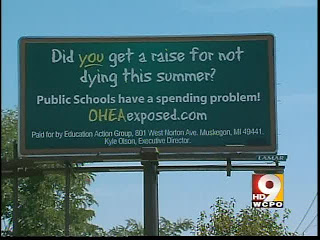The Columbus Dispatch certainly isn’t a Democratic mouthpiece, and it’s taken plenty of shots at public schools and educators over the years; but the newspaper recently analyzed some Josh Mandel campaign ads that seem to show the Ohio Treasurer candidate to be a liar.
Author: StgCoach
Had Enough Yet?

And now, as governor-elect, Kasich says, “the public-employee unions, particularly the teachers union, you know how I feel about them, . . . but for the unions that make things, I’m going to sit down with them.”
- If you are a public educator in Ohio, you sit squarely in the crosshairs of a movement which has decided that you are the problem.
- If you are a Republican public educator, your party has walked away from you. With relatively few exceptions, Republican candidates refused to meet with the educators serving on our screening committees for this year’s elections.
But wait, it gets worse: the Republicans aren’t the only party we’ve lost. The Obama administration’s embrace of merit pay, union-busting, and charter schools tells us that a “D” after the official’s name doesn’t reliably label a friend.
- Far too many of our colleagues don’t believe us when we tell them about the peril they’re in. If the Republicans are smart, they’ll treat us right and show that all the fear we’ve been mongering among our members is just hysteria. But I don’t anticipate that; that would be far too subtle, and subtlety isn’t the strong suit of politicians of any stripe.
- Too many of our colleagues support public education only when it suits them. They support public schools in the suburbs but not in the cities. They support the public schools where they work but not the ones where they live. Or (I’m a parent, and I know this is problematic) they send a message to their neighbors by sending their own kids to nonpublic schools.
- Unfortunately, many public educators belong to locals whose presidents don’t deliver the organization’s message. So we keep preaching to the saved but we never get a chance to preach to the rest.
Now Is the Summer of Our Discontent
- In 1998, NEA delegates rejected the “Principles of Unity,” which would have set us on a path toward a merger with the American Federation of Teachers. Along with a majority of the Ohio delegation, I supported the Principles, and it’s possible that the RA’s failure to adopt them helped set the stage for the second.
- This year, RA delegates finally began to confront three uncomfortable truths that we should already have known. First, support of any candidate is a marriage of convenience: any office-holder will sacrifice virtually any ideal if it means being re-elected. Second, many Democratic officeholders have accepted the three basic tenets of Republican doctrine on public education: accountability, school choice, and the obstinacy of teachers’ unions. Third, public educators can rely on no one but themselves to understand and support their issues.
This RA was the least hopeful and the most angry of the ones I’ve attended. The delegates’ discontent is fueled by two realizations.
- We are politically alone. The Democratic Party uses us and the Republican Party hates us.
- We have so far been unable to energize our enormous membership base and realize more than a fraction of its political potential.
I don’t believe for a moment that we are wrong. Accountability and school choice are disastrous doctrines that, left unchecked, will destroy American public education. The teachers’ unions, far from blocking their members’ desires for reform, are accurately voicing concerns shared by the overwhelming majority of public educators.But I do believe that wishful thinking has dominated our internal dialogues and delayed our actually doing anything about the critical issues I have outlined here. In the weeks ahead, I am going to post an analysis of the issues I have raised here. I invite interested readers to come back from time to time and to post their own comments.
